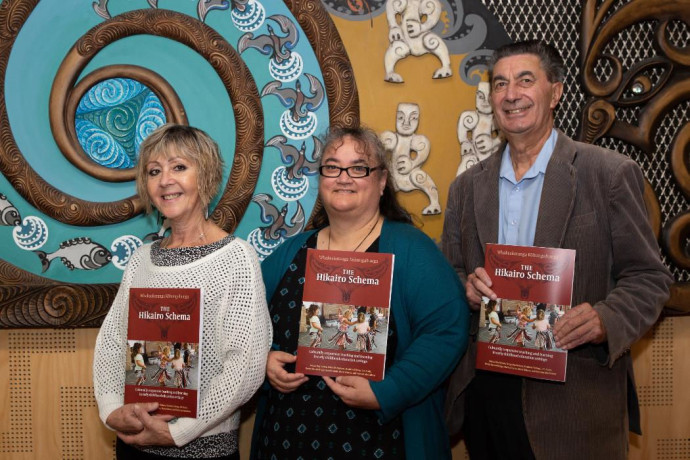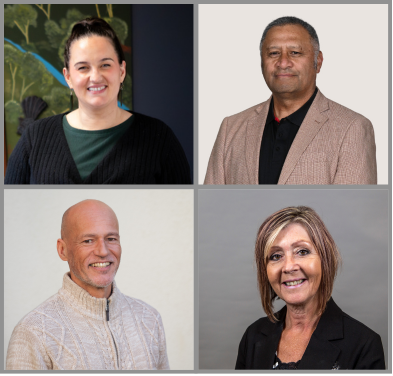2025 Te Rangaunua Hiranga Māori Medal

Te Kāhui-a-Te-Rū-Rangahau, of the School of Teacher Education at Te Whare Wānanga o Waitaha – the University of Canterbury, has won the Te Rangaunua Hiranga Māori Medal for co-creating guides to enable culturally responsive teaching in Aotearoa New Zealand.
The Hikairo Schema book series and its tertiary companion volume, Ngā Hau e Whā o Tāwhirimātea, were created by Te Kāhui-a-Te-Rū-Rangahau with and for kaiako teachers. The guides provide developmentally appropriate, evidence-based strategies to inform teaching practice.
The Hikairo Schema books are designed to support teaching at early childhood, primary, intermediate, and secondary stages. They have been widely used in Aotearoa New Zealand (as part of the Better Start literacy approach) and internationally.
Ngā Hau e Whā o Tāwhirimātea is an open-access publication that has been designed for use in undergraduate and postgraduate teaching.
Te Kāhui-a-Te-Rū-Rangahau team members:
- Ms Jennifer Smith (Ngāti Whātua, Te Roroa, Ngāpuhi)
- Associate Professor Sonja Macfarlane FRSNZ (Ngāi Tahu, Ngāti Waewae)
- Associate Professor Te Hurinui Renata Karaka-Clarke MRSNZ (Te Arawa and Ngāi Tahu)
- Dr Matiu Rātima (Whakatōhea, Ngāti Pūkeko)

Clockwise from top left: Jennifer Smith, Te Hurinui Karaka-Clarke,Sonja Macfarlane, Matiu Rātima.
Associate Professor Sonja Macfarlane FRSNZ explains that this work was inspired by ‘The Hikairo Rationale’ framework, originally created in the late 1990s by the late Professor Angus Hikairo Macfarlane FRSNZ (Ngāti Rangiwewehi, Ngāti Whakaue).
Over many years since its genesis, Angus shared the doctrine of this framework with teachers and educators, who regularly asked him about the "how-to" aspect – how could they apply the theory and principles in practice?
“Motivated by these pertinent queries, he further refined the framework over the subsequent few years, to create ‘The Hikairo Schema’, and in 2016, he brought together various teams of colleagues to create a series of practical handbooks,” Sonja says.
“Angus' vision was to create resources that could encourage, empower, and support teachers and educators – across the range of education contexts – to instantiate culturally-responsive pedagogies within their everyday practice.”
The problem the resources seek to solve is “filling the void that exists between the theory and practice”.
“The resources do this by providing practical examples that enable teachers and educators to apply their new knowledge in non-threatening and mana-enhancing ways,” Sonja says.
“They can manage their own learning at a pace that is doable and can see the benefits that are able to accrue for both them and their learners.”
The team members say that winning this Medal “not only affirms the work of so many dedicated and caring people, but it acknowledges the ground-breaking legacy that the late Professor Angus Hikairo Macfarlane gifted to us all,” Sonja says.
“His vision saw more than can ever be captured in mere words – it was one which saw unwavering strength and hope, even during times of adversity – reflective of his favourite whakatauki: He moana pukepuke e ekengia e te waka – a choppy sea can be navigated.”
Te Rangaunua Hiranga Māori Award:
For excellent and innovative research co-created in community contexts by Māori, that has made a distinctive contribution to community wellbeing and development in Aotearoa New Zealand.
Citation:
To Te Kāhui (Jennifer P Smith, Sonja Macfarlane, Te Hurinui Renata Karaka-Clarke,and Matiu Te Rātima) for transforming teacher education by creating practical, flexible research-informed guides designed with, by and for Kaiako.
